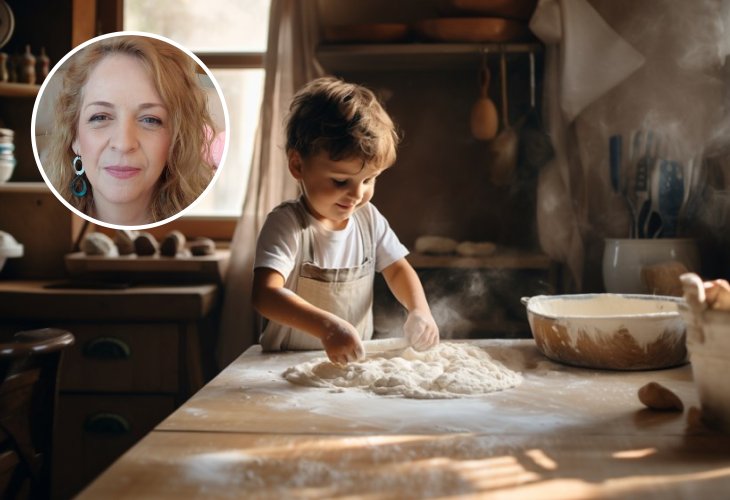Ruti Lax: "People Think if They Were Born Extra Sensitive, They're Destined to Suffer"
They struggle with loud noises, strong smells, and sounds, often perceived as dramatic or spoiled by society. Yet many are simply 'highly sensitive people'. An interview with emotional therapist Ruti Lax.

There are moments in life considered life-changing discoveries, significantly altering our understanding of the world. Such was the moment for Shira (a pseudonym), at the age of 30 when she first realized that all the symptoms she was experiencing had a name and a clear diagnosis. "From a young age, I was considered much more sensitive and emotionally expressive than other children," she describes. "I remember clinging to my mother at family events, unable to handle the noise, crowds, and chaos that overwhelmed me. I always hoped it would pass as I grew up, thinking it was something typical of children."
"But as years passed, this sensitivity didn't change," she continues. "On the other hand, I was also a sort of 'mature kid' who sensed everyone around me, exceptionally sensitive and empathetic, quickly understanding things with a much higher emotional intelligence than others of my age."
"Even as an adult, there were times when things were hard: I knew there's something delicate in me struggling with loud noises, feeling things happening to me or around me more intensely than others, which I had to cope with, for better or worse. Deep down, I felt somewhat different from most people, but I couldn't quite pinpoint why. I think my parents and those close to me felt the same way. They greatly appreciated this wonderful gift of my sensitivity towards them but sometimes feared hurting me or felt the need to protect me, which is an experience I hate."
Several years ago, Shira's life changed after reading a groundbreaking book, 'The Highly Sensitive Person' by Dr. Elaine Aron. The book describes a group of people in the population born with more sensitive nervous systems experiencing symptoms of heightened sensitivity. "I'll never forget the day I came across the first article about this in a major newspaper," Shira says. "The article described my familiar symptoms exactly and then gave it a name: 'Highly Sensitive Person'. It opened a door to all the potential benefits of this sensitivity and provided ways to manage and regulate emotional overload, so over the years, I've learned to use it effectively, which really benefits me."
Ruti Lax, an emotional therapist, is also very familiar with the field: "My connection to the topic comes from a personal place for myself and those close to me. In my profession as an educational counselor, I specialize in advising and treating highly sensitive people who didn't receive the appropriate care they needed from childhood, turning this sensitivity into a kind of emotional limitation. I encounter many such people in my clinic."
Ruti came to specialize in this area after discovering she herself fits this definition: "One day, my mother brought me a new book that came out called 'The Highly Sensitive Person' and asked me to read it. From there, things unfolded. Suddenly, I realized this thing I've carried with me for years had a clear scientific definition, and I'm not alone. There are ways to work with it."
So, what exactly is a 'Highly Sensitive Person'?
"Statistically, about 15-20% of the population fits this description, and interestingly, about 15-20% of animals in nature also seem more alert. It refers to someone whose processing of their surroundings is very deep and intense, making them more affected than others by what they encounter. As a result, they tire more quickly due to the emotional processing intensity. It's important to emphasize they're not spoiled, hysterical, exaggerating—nor is it necessarily about a woman," she laughs. "Men can be just as sensitive, but in Israeli society, where men are expected to be masculine and tough, they might strive to hide it."
"On the other hand, in terms of their strengths, the flip side is that these individuals are also more empathetic and sensitive to others, easily sensing those around them and their needs because of their high sensitivity."
So how does high sensitivity develop? Is it something that happens with life, or are people born with it? Lax has a clear answer: "There's a significant genetic element indicating it's innate, but what happens afterward largely depends on the environment: whether it's supportive, understands their needs, and aids in managing and regulating this sensitivity, seeing the immense benefits, strengths, and potential, or whether it dismisses and diminishes, viewing it as a disadvantage."
 (Photo: ShutterStock)
(Photo: ShutterStock)Can 'high sensitivity' be 'treated'?
"It isn't an illness or disorder," she explains. "It's a genetic trait, which if not appropriately addressed, can develop into various challenges. It is sometimes confused with ADHD since it's not yet well-recognized in Israel or even autism when a child is very withdrawn. But it's really not a disorder; it's a genetic trait that can become imbalanced without the correct response. Preventive care is very important: first of all, it requires internal work to acknowledge you're a highly sensitive person and accept that. This includes developing self-regulation and management skills, and if you're a parent to such a child—dealing with it concerning your child. It needs a lot of work on listening and respecting this. Respecting the timeout that these people often need."
"As adults, it's crucial to adopt consistent habits related to ventilation, meaning the ability to share and process experiences—such as writing, art, or sports therapy. Emotional therapy focusing on methods like CBT and DBT is also very helpful."
Beyond personal coping, Ruti describes how high sensitivity impacts relationships. "I often address the detrimental aspect in such individuals because highly sensitive people frequently enter harmful relationships by virtue of their sensitivity. Often the sensitive nature and feeling of 'I'm not worthy' receive feedback labeling them as hysterical or overreacting; this creates an impression on themselves that they're not good enough and causes them to compromise in their relationships, even when they're hurt. When they're seen, accepted, and understood, and the beauty in their sensitivity is recognized, they can achieve much more. If they don't receive the necessary response, they may enter disrespectful relationships."
How can one find someone who understands and accepts this?
"Within relationships, it's truly a big challenge, but here I say it's work with yourself—that it's okay to be this way. Then you don't sell yourself short because something is wrong with you. In relationships, I see highly sensitive people connecting with others who are sensitive, and those who connect with non-sensitive people—the failure usually occurs when a highly sensitive individual connects with someone who is their opposite, who isn't sensitive. However, often someone who is slightly more sensitive than average with a highly sensitive person—these couples usually succeed because there's someone to balance them. This, of course, requires a lot of communication about the situation."
So being a sensitive person, is it more positive or negative?
"This trait of high sensitivity is neither positive nor negative, but the truth is it is a positive trait if used correctly. In today's younger generations, I see more and more positive feedback for this trait, improving their situation, and they learn to appreciate this gift and their capabilities within it. Therefore, at its essence, it is a good thing if you receive the appropriate framework. You can see such people in various positions, reaching, for example, management roles precisely because they can identify emotions and work with them. Personally, I had a manager who profoundly understood and empowered me."
"In parenting, for example, they can be amazing parents. In all things related to people, it is very essential in life. If you receive the framework and correct validation of your emotions, rather than scorn—it can be a superpower, the ability to communicate with people at work, identify trends related to emotions, developments related to humans. When you yourself receive validation that it's okay, and you're in harmony with it, not impacting your self-esteem—it takes you to very positive places you otherwise couldn't reach."
"Connecting to a spiritual world is easier for sensitive people; their personality and connection to depth and emotions align more easily. It gives them meaning through suffering, connecting to Hashem; they embrace this more easily since something intrinsic in their personality aligns better with these depths and emotions. Hence, tools from the world of meditation, prayer, mindfulness, looking at life not from a simplistic perspective but a deep and meaningful one. The sensitive person seeks meaning and emotion, and the spiritual world connects with them easily, not rooted in the concrete and material, thus it is something truly valuable if you're there."
 (Photo: ShutterStock)
(Photo: ShutterStock)What is motherhood like for children with high sensitivity?
"The most important thing is validation, meaning understanding that your role is to affirm to your child that it's okay and great to be this way. Encourage them to always connect with places, frameworks, and people who perceive them positively. Sometimes there's a need for practice and rehearsals as coping tools, kind of a dry run for overwhelming situations, so they feel confident getting through them. Tell the child, 'Okay, something's happening at school? Let's rehearse it together.' This advice applies even to adults, and it has a wonderful effect."
"Beyond that, teach your child to take care of themselves: understanding that alongside the blessing and the ability to feel others and be a good friend, there is something more intense. They need to aware that at times, quite frequently, like on a plane, they need to put on their oxygen mask to have the strength to cope, and that's perfectly normal and okay. Ultimately, when a child is happy and confident in the positive aspect of their high sensitivity—the sky is the limit to the good they can achieve in the world, and the kind of adult they can grow to become."
Ruti Lax was interviewed on "It’s Not Taken for Granted," hosted by Moran Kurs. To view the full episode, click here

